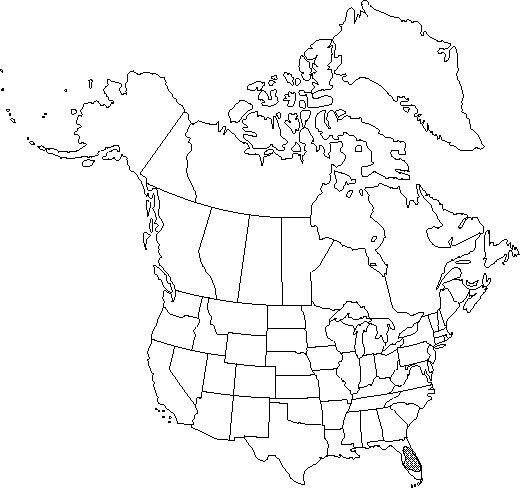Difference between revisions of "Carya floridana"
Trees & Shrubs 2: 193, plate 177. 1913.
FNA>Volume Importer |
FNA>Volume Importer |
(No difference)
| |
Revision as of 19:54, 24 September 2019
Trees, to 25 m; more often shrubs, 3-5 m. Bark gray, smooth or fissured. Twigs reddish brown, slender, glabrous to scaly. Terminal buds golden to rusty brown, ovoid, 3-9 mm, hirsute along margins and densely scaly; bud scales imbricate; axillary buds protected by bracteoles fused into hood. Leaves 2-3 dm; petiole 4-7 cm, with coarse hairs and scales in spring. Leaflets 3-7, lateral petiolules 0-1 mm, terminal petiolules 0-5 mm; blades ovate to elliptic or obovate, not falcate, 4-10 × 2-4 cm, margins often coarsely serrate, apex acuminate; surfaces abaxially with unicellular and 2-8-rayed fasciculate hairs restricted to axils of secondary veins, large peltate scales and small irregular and round peltate scales imparting rusty brown color, adaxially with peltate scales in spring. Staminate catkins pedunculate, to 6 cm, stalks with coarse hairs, rusty brown scales, bracts scaly, sparingly hirsute; anthers hirsute. Fruits bronze to dark brown, obovoid to oblong, not compressed to slightly compressed, not angled, 3-4 × 2-2.5 cm; husks rough, 2-3 mm thick, dehiscing to base, sutures slightly winged; nuts tan, ellipsoid, slightly compressed, not angled, rugulose; shells thick. Seeds sweet. 2n = 64.
Phenology: Flowering spring.
Habitat: Sandy ridges of sand-pine scrub
Elevation: 0-50 m
Discussion
Carya floridana intergrades with C. glabra in areas where their ranges overlap.
Selected References
None.
